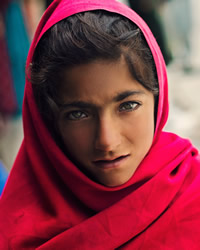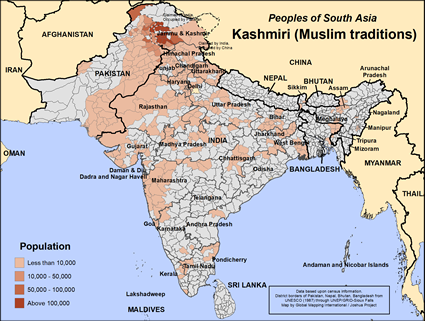Kashmiri (Muslim traditions) in India

Photo Source:
Muaz Asim - Wikimedia
Creative Commons
|

Map Source:
People Group data: Omid. Map geography: UNESCO / GMI. Map Design: Joshua Project.
|
| People Name: | Kashmiri (Muslim traditions) |
| Country: | India |
| 10/40 Window: | Yes |
| Population: | 6,772,000 |
| World Population: | 8,112,000 |
| Primary Language: | Kashmiri |
| Primary Religion: | Islam |
| Christian Adherents: | 0.00 % |
| Evangelicals: | 0.00 % |
| Scripture: | Complete Bible |
| Ministry Resources: | Yes |
| Jesus Film: | Yes |
| Audio Recordings: | Yes |
| People Cluster: | South Asia Muslim - other |
| Affinity Bloc: | South Asian Peoples |
| Progress Level: |
|
Introduction / History
The Kashmiris are descendants of Indo-Aryan immigrants and are generally tall, fair skinned, and have features like the people of Central Asia. Their homeland, Jammu and Kashmir, is a breathtaking region located in the western Himalayan Mountains. Unfortunately, this land is highly disputed. It has been a battleground between India, Pakistan, and China since the partition of the India and Pakistan in 1947.
When India and Pakistan were divided, Jammu and Kashmir was given the choice of siding with either of the two countries. Since the ruling class was Hindu, they sided with India. However, most of the people were Muslims and felt more connected to Pakistan. Today, parts of Jammu and Kashmir are controlled by India, parts by Pakistan, and parts by China; and fierce fighting continues.
More than ninety percent of Jammu and Kashmir is mountainous. It includes the Karakorum Range, which contains K2, the second highest peak in the world. Most of the region is under snow and glaciers all year due to its extreme elevation.
What Are Their Lives Like?
Most of the Kashmiri are farmers. They raise rice, wheat, maize, barley, lentils, and fruits such as apples, peaches and apricots. The lakes of Jammu and Kashmir supply many fish and water chestnuts. They raise sheep, goats, and yaks at higher elevations. These flocks produce cashmere, a rich wool that is also very popular in the West. Kashmiri men primarily tend to the farms, and the women usually stay home and tend to the household chores.
Festive celebrations and pilgrimages to shrines are times for uniting Kashmiri communities. The villagers enjoy gathering around a fire and sharing folk tales or ballads. They also enjoy music and dancing. Cricket and soccer are some of their favorite sports.
Extended families commonly live together. Their house styles vary with the elevation. In mountainous areas where there is much snow, the roofs are triangular and steep. Houses in the rural valley regions often have storage areas for grain, fodder, fuel, wood, leaves, charcoal and dried dung. All of these materials are necessary when winter conditions become severe. The homes are usually built out of stone, brick, thatch and timber.
The Kashmiri are very hospitable people and enjoy entertaining guests over tea. Their diet is similar to that of other Indians. Wood, dung and kerosene are the main sources of fuel for cooking.
In addition to farming, many of the Kashmiri are skilled crafters of wood furniture, wool carpets and sweaters. Industrial development is limited in Jammu and Kashmir, but the large number of timber forests and rivers are used for producing hydro-electric power. Tourism is also an important industry. During the blazing hot summer months, Indian nationals love to cool off in Kashmir's mountain resorts. Unfortunately, the constant low grade war between India and Pakistan drives away much of their business.
What Are Their Beliefs?
Most of the Kashmiri are devout Sunni Muslims, who follow a strict code of conduct. Their civilization has been heavily influenced by Muslim mystics and Persian culture. Only a small minority are Hindus, and most of these are leaving the region.
Kashmiri Muslims are convinced the Bible is wrong when it contradicts the Koran. Those who convert to Christianity are viewed as immoral, degenerate people; Christians in this region are often persecuted. Many Kashmiri have heard of Jesus Christ but view him merely as a prophet and teacher. They do not understand that Christ provided the only way to be in good standing with God.
What Are Their Needs?
Kashmiris need protection. They are very vulnerable because they live in a war zone. Most would prefer to be left alone, but their homeland is dominated by India's military. Pakistan wants to control Kashmir, but they have nothing to offer but a cultural and religious connection.
Prayer Points
Ask God to give innocent Kashmiris his divine protection.
Pray for the effectiveness of the JESUS Film and other audio materials among the Kashmiris.
Ask God to soften Kashmiri hearts towards the gospel of Christ.
Pray that God will give these precious people a revelation of who Jesus truly is: their Lord and Christ.
Pray that soon there will be Kashmiri followers of Christ who will disciple others.